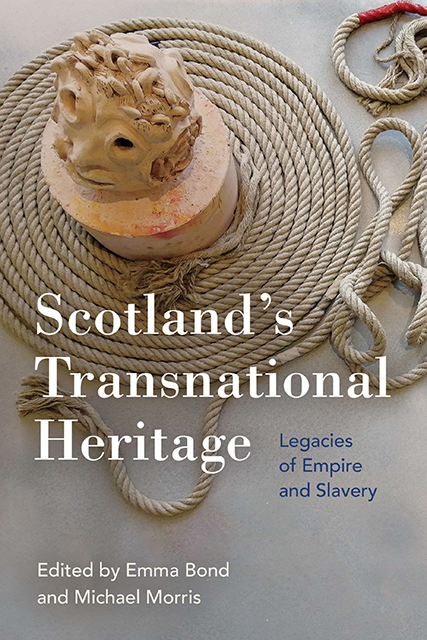Book contents
- Frontmatter
- Contents
- List of Figures
- Notes on Contributors
- Acknowledgements
- Foreword: Fostering Recognition under the Luxury of Amnesia
- Chapter 1 An Introduction to Scotland’s Transnational Heritage: Sites, Things and Time(s)
- Part I Transnational Sites
- Part II Transnational Things
- Part III Transnational Time(s)
- Afterword: Building Solidarity: Moving Towards the Repatriation of the House of Ni’isjoohl Totem Pole
- Index
Chapter 9 - Telling a Fuller Story: Scottish Design, Empire and Transnational Heritage at V&A Dundee
Published online by Cambridge University Press: 25 October 2023
- Frontmatter
- Contents
- List of Figures
- Notes on Contributors
- Acknowledgements
- Foreword: Fostering Recognition under the Luxury of Amnesia
- Chapter 1 An Introduction to Scotland’s Transnational Heritage: Sites, Things and Time(s)
- Part I Transnational Sites
- Part II Transnational Things
- Part III Transnational Time(s)
- Afterword: Building Solidarity: Moving Towards the Repatriation of the House of Ni’isjoohl Totem Pole
- Index
Summary
Introduction
In August 2019, V&A Dundee hosted a one-day workshop organised by the Transnational Scotland network, an inter-disciplinary research cluster comprising academics, cultural heritage professionals and creative practitioners. The impetus for the workshop came from staff at V&A Dundee who saw it as an opportunity to gain feedback on the curation and interpretation of the Scottish Design Galleries, which had opened less than a year earlier along with the rest of the museum. Wishing to work through aspects of the galleries that curators felt were unresolved, and conscious especially of the need to more fully acknowledge Scotland’s role in slavery, colonialism and imperialism, staff knew the workshop would expose inaccuracies, misrepresentations and omissions and were hopeful it would help them identify ways to address these issues. This chapter takes up these concerns and comprises a conversation between two of the workshop participants, Meredith More, Curator at V&A Dundee, and Dr Rosie Spooner, Lecturer in Information Studies at the University of Glasgow.
Our discussion took place over Zoom in July 2020. We spoke at length about the initial brief for the Scottish Design Galleries and their conceptual development, as well as the curatorial process and interpretive approach. We also resumed the subject of a paper Rosie presented at the workshop, which discussed the Cathedral Church of All Saints in Khartoum, designed and built by the Scottish architect Robert Weir Schultz. In her paper, Rosie critiqued the museum’s failure to situate the architect’s drawings of the building, which are displayed in the Scottish Design Galleries, within the context of Britain’s military imperial occupation of Sudan, and suggested that the language used to describe them reinforced Eurocentrism. Meredith explained the museum’s response to this, offering a candid appraisal of the challenges inherent in defining and curating ‘Scottish design’ and of the collaborative ways in which the museum will now seek to work to ensure the galleries change and evolve in the future. This led us to reflect together on broader issues of representation and voice within museums, commissioning, collaboration and consultation, institutional humility, and museum decolonisation.
We both believe that museums must embrace more open and reflexive practices.
- Type
- Chapter
- Information
- Scotland's Transnational HeritageLegacies of Empire and Slavery, pp. 136 - 154Publisher: Edinburgh University PressPrint publication year: 2023



